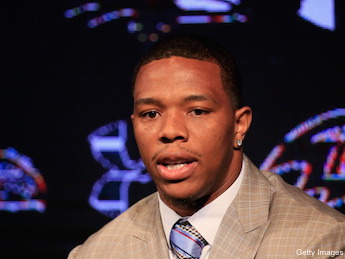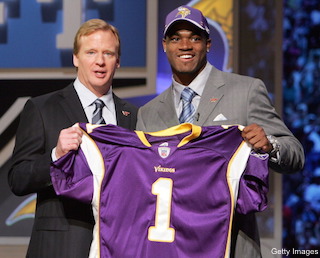The dramatic circumstances of the Ray Rice and Adrian Peterson cases raise the issue of which aspects of an athlete's private life should be subject to public awareness and judgment. The lines between public and private have been blurred with the development of social media and cellphone technology. When an athlete leaves his home, every moment can be captured on a phone or tablet camera providing images and sound.
When Matt Leinart was quarterback for the Cardinals, he was relaxing in his own home in his private time when a jacuzzi photo of him and several woman was captured. That led to mistaken impression. These images can then be uploaded to the Internet and travel across the country.
Clearly when a law is broken, it becomes a public matter. Rice and Peterson broke laws and were arrested. This is a change from the "good old days" in sports when domestic violence and abusive parenting were kept in the closet and were never reported. That privacy victimized woman and children and kept them in peril; the legal system often re-victimized them. Both these cases created better awareness and spurred action toward prevention and swift punishment. This is a constructive aspect of celebrity driven media exposure.
Where is it appropriate to publicize athlete's private lives? Traditionally there have been different approaches to discipline in parenting. What is seen as abhorrent by some people is considered good parenting by others. Beating a toddler with a tree branch so that he is injured clearly crosses the line.

Is it fair to scrutinize the discipline when it falls short of violating a law? Certain athletes have fathered children with multiple mothers. Is this a behavior which should be publicized? There is no question that children parented by single mothers face challenges that others don't. Is it fair to single out those fathers for censure? Or is it nobody's business but the parents?
Donald Sterling said abhorrent and harmful things on a tape with his girlfriend. Few would disagree that harboring and expressing those thoughts should disqualify someone from NBA ownership. But is all private conversation fair game for exposure? Should anyone using a phone, or speaking in privacy be subjected to public scrutiny? If there was a method of recording someone's internal thoughts, should they be subject to public scrutiny? Hasn't virtually every person who has been angry or careless expressed themselves in a way that might hurt someone else's feelings, or offend someone if exposed?
There is a visceral reaction in this country toward the widespread tracking by the NSA of private phone calls. Fears of "1984" thought control and a police state were expressed. Celebrity media draws an audience and profits mightily from the most embarrassing activities and statements of their targets. Controversy sells. An intelligent discussion of which lawful behavior and speech should be considered public, is long overdue.
-- Leigh Steinberg has represented many of the most successful athletes and coaches in football, basketball, baseball, hockey, boxing and golf, including the first overall pick in the NFL draft an unprecedented eight times, among more than 60 first-round selections. His clients have included Hall of Fame quarterbacks Steve Young, Troy Aikman and Warren Moon, and he served as the inspiration for the movie "Jerry Maguire." Follow him on Twitter @leighsteinberg.















